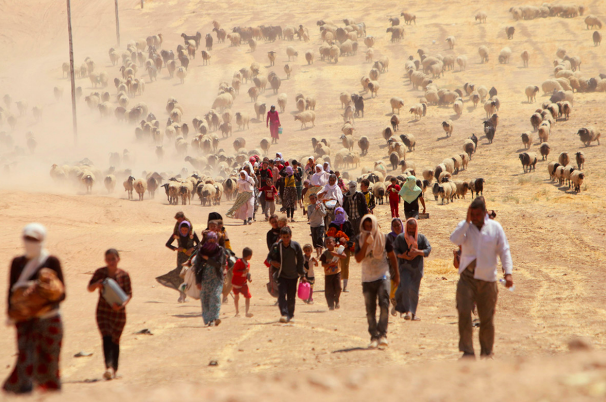(Refugees fleeing Iraq- www.ibtimes.co.uk Mid August 2014)
On August 4th 1914 Britain declared war on Germany. It was a declaration which plunged the nations into World War I, ‘the war to end all wars’. This year, the centenary of World War I, a war which took the lives of around 9 million people, is being commemorated by various nations in Europe and also in the country where I live, Australia. A devotional that I am using this month has taken the opportunity to focus on the topic of war and violence as a result, and one entry reads, ‘This year we commemorate the centenary of the start of the “war to end all wars”. The last veterans have died and the village war memorials, with their tragic lists of the dead, are weathered with age, but war itself is not history and soldiers have not gone away…there are more than 50 conflicts continuing in the world today. As Christians we must not simply ignore them or wish them away.’ I read all of this in the midst of the violent, horrific persecution of minorities including Christians by ISIS or Islamic State in Iraq occurring right now, and the point about the continuation of war, violence, persecution and tragedy in our world is made especially poignant to me.
Reflecting on all of this and especially what is going on in Iraq, has put me in a somewhat sombre mood over the last month. Moreover, even though war has always had its propaganda machinery in place, today we have to contend with social media which as we all know, has a helpful side as well as a dark side. My Facebook feed has been saturated with information and gruesome photos around what is occurring in Iraq. Of course this has also generated debates and posturing by Christians as we all react with shock at what is occurring in the Middle East. Some argue that we need to post on social media as much information and as many photos as possible so that people will be shocked into action. This stance is taken in an almost crusade like style in order to help Christians ‘wake up’ to the reality and threat of these awful events. Others take a more rational approach and question the validity of the information being received as did Joe Carter from The Gospel Coalition in this controversial post1. Some, most surprisingly of all I think, have no or very little response and become paralysed by the overwhelming reality of the horrific events unfolding. Our temptation may be to retreat into our private middle class existence and focus on the daily stuff of life that brings us comfort rather than face the global challenges posed. We are all tempted to do this, me included. So what can we do? What should be our response? I realise that I am walking over a minefield here where many have already trodden. I am not attempting in this short post to cover the range of issues regarding a Christian response to war or intersections between the church and the state regarding violence or military intervention in troublesome areas. What I’d like to do is offer some brief ideas based on the ethic of Jesus which can help us to respond well to the events of the day. Despite our theologies and positions on war and intervention, despite our national loyalties or non loyalties, despite our cultural, historical and institutional sensitivities, surely all of us must strive to respond in a Christ like way to the situation in Iraq today?
Mourn with those who Mourn
As I was reflecting on Romans 12:9-21 last week and thinking through what it means for us and for persecuted Christians to ‘Bless those who persecute you; bless and do not curse them’ (v14), the verse that actually stood out to me was the one that came after, ‘Mourn with those who mourn’ (v15) or ‘weep with those who weep’. There is a lot of grief, mourning, sorrow and weeping happening in the Middle East right now especially coming from our brothers and sisters in Christ who are being persecuted for their belief in Jesus. Can we imagine the grief experienced after having lived in a land which is your home then suddenly being forced to move out? Can we imagine the sense of threat that we would feel if three options were given to us by a cruel authority; convert to another religion, be permanently treated like a second class citizen or face death? Can we think about what kind of future children have in a situation like this? We need to grieve, weep and mourn for our brothers and sisters in Christ in the Middle East right now. Now is a time to sing songs of lament in solidarity and empathy with the global church.
Practice Peace
Jesus said that we are blessed if we are peacemakers. Surely, especially during times of upheaval, it is an opportunity to carefully look at what we have tolerated in our theology and practice which has lead to violence or hatred. I found this article about Jeremy Courtney which asks us to question the subtle, unholy alliance between Christianity and violence helpful2. Courtney says ‘We need a long-term plan, not just a short-term fix. There are agencies helping Christians, Yezidis, Turkmen, Shabak and others, and those services are necessary. But this isn’t only about what Obama or Maliki must do now. The Christian church needs to reconsider its relationship with violence; that is part of what has landed us and others in this dire situation. We cannot carp about Christian persecution and not talk about violence and our use of violent solutions. We need a 40- to 50-year plan so that when the time comes to overthrow the next dictator, we are not as blind to our own complicity and stuck with short-term gains.’ Apart from applying this examination to what is occurring in Iraq, how can we Christians in the West practice daily peace? How can we practice peace as we post and debate on Facebook? How can we practice peace in our neighbourhoods? How can we practice peace in our most intimate relationships? What can we do to evacuate violence in our theology and practice? How can we make sure we are not complicit in our culture of violence?
Engage in ‘Shalom Activism’
Often, engaging in the practice of peace making has the connotation of being passive. However this does not have to be the case if we model ourselves on Jesus who often used words and took actions that were subversive, provocative and intentionally confrontational. I have often wondered for example, why Jesus decided to heal on the Sabbath, knowing full well that it would upset some people in those days. I have heard the term ‘shalom activism’ used to describe actions undertaken by Christians which function to bring peace and wholeness into our world. These acts can range from writing to our national leaders to ask for a greater intake of refugees in our nation to help those fleeing persecution, which many Christians have done over the last weeks regarding the situation in Iraq, to staging peaceful protests regarding the build up of hatred and injustice in Iraq and other places under threat. I have been so encouraged by Christians in Australia who are taking a peaceful yet confrontational stance on our government’s cruel policy around refugees by writing documents clearly stating our rejection of certain harmful policies or by staging prayer vigils in the offices of local members of parliament. Prayer is a subversive act that threatens the powers that exist as they begrudgingly recognise the reign of God which will eventually be clearly revealed and will fill our reality. Are we interceding like that persistent widow in the Gospel of Luke for situations where there is hatred, cruelty and bloodshed such as in Iraq right now?
Practice Loving Enemies
As a part of my doctoral project I asked a group of Christians from our church to regularly engage in missional practices, one of which is engaging in acts of ‘radical hospitality’. A few weeks ago one participant decided as a part of showing hospitality, to leave some dried dates for a group of Muslims who were praying in the room next to where we worship on a Sunday as they broke their fast for Ramadan. A note was left saying ‘God bless’. The other day, one of the praying Muslims came into our worship gathering to gift us with some cakes and sweets in response to our act of hospitality. It gave me hope in the midst of the tensions of today especially between Christians and Muslims. Many voices in our culture and our religions would unhelpfully try to convince us that we are enemies. However, even if we sometimes are enemies such as in the case with ISIS and Christians today, we are told by Jesus to love our enemies. Will we take his words seriously and practice them or will we write them on pretty plaques and place them on our freshly painted walls in our comfortable houses as mere ideals to aspire to? No one is saying this is easy, least of all for those poor people fleeing persecution right now. But our one distinction as Christians is not primarily our anger, our passion, commitment or even our hold on truth. As important as those qualities are, our one unique mark is supposed to be the practice of Christian love. This is a love that emulates the love of a God who gave his life for the world even when the world was his enemy.
Even within the context of abounding hatred today, how can we practice loving our enemies?
—






Missio Alliance Comment Policy
The Missio Alliance Writing Collectives exist as a ministry of writing to resource theological practitioners for mission. From our Leading Voices to our regular Writing Team and those invited to publish with us as Community Voices, we are creating a space for thoughtful engagement of critical issues and questions facing the North American Church in God’s mission. This sort of thoughtful engagement is something that we seek to engender not only in our publishing, but in conversations that unfold as a result in the comment section of our articles.
Unfortunately, because of the relational distance introduced by online communication, “thoughtful engagement” and “comment sections” seldom go hand in hand. At the same time, censorship of comments by those who disagree with points made by authors, whose anger or limited perspective taints their words, or who simply feel the need to express their own opinion on a topic without any meaningful engagement with the article or comment in question can mask an important window into the true state of Christian discourse. As such, Missio Alliance sets forth the following suggestions for those who wish to engage in conversation around our writing:
1. Seek to understand the author’s intent.
If you disagree with something the an author said, consider framing your response as, “I hear you as saying _________. Am I understanding you correctly? If so, here’s why I disagree. _____________.
2. Seek to make your own voice heard.
We deeply desire and value the voice and perspective of our readers. However you may react to an article we publish or a fellow commenter, we encourage you to set forth that reaction is the most constructive way possible. Use your voice and perspective to move conversation forward rather than shut it down.
3. Share your story.
One of our favorite tenants is that “an enemy is someone whose story we haven’t heard.” Very often disagreements and rants are the result of people talking past rather than to one another. Everyone’s perspective is intimately bound up with their own stories – their contexts and experiences. We encourage you to couch your comments in whatever aspect of your own story might help others understand where you are coming from.
In view of those suggestions for shaping conversation on our site and in an effort to curate a hospitable space of open conversation, Missio Alliance may delete comments and/or ban users who show no regard for constructive engagement, especially those whose comments are easily construed as trolling, threatening, or abusive.